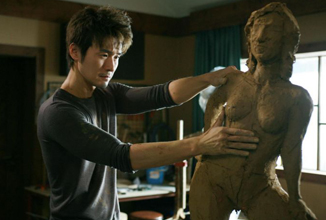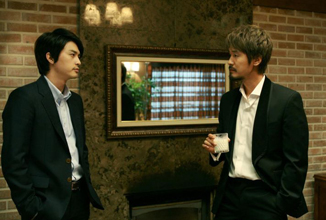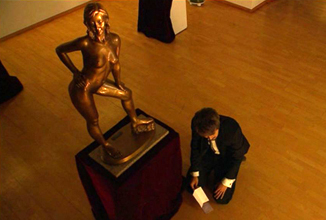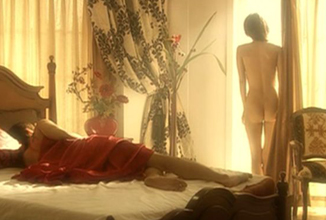"That statue you're holding is the woman I love."
Synopsis:
Sculptor, and teacher, Hwang Jun-hyuk (Lee Sung-jae) has just completed the first public exhibition of his work in ten years, with the centerpiece of the event being a bronze nude entitled 'Natali'. As he gathers his thoughts after the guests have departed, one of his former students, Jang Min-woo (Kim Ji-hoon), turns up at the exhibition hall asking to buy Natali and claiming that the statue is based on a girl, Oh Mi-ran (Park Hyun-jin), whom both men obviously know. When Jun-hyuk refuses to sell the statue at any price, Min-woo demands to know the nature of Jun-hyuk and Mi-ran's relationship, but as Jun-hyuk relates the secrets behind their story, Min-woo begins to reveal some secrets of his own...
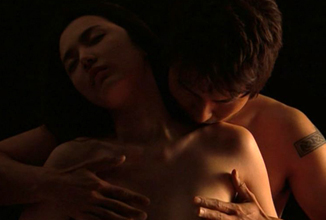 |
 |
Review:
With the first scene of the film showing Mi-ran and Jun-hyuk making passionate love, Natali initially appears to making its intentions - to be an erotic, graphic, 'art' film - very clear. However, this sex scene (as well as the many subsequently appearing) is neither particularly sensual nor, in fact, massively explicit by today's standards, and apart a minor amount of full-frontal female nudity much later in proceedings, the graphic content is of a similar level to a number of other classic South Korean films which are both vastly superior in their plotlines and storytelling, and also contain a palpable eroticism which is, sadly, utterly lacking in Natali - e.g. Happy End, Green Chair, and even The Housemaid (2010), to name but three.
This wouldn't actually be worth even mentioning except for the fact that almost the entire marketing of Natali has been based around the 'supposedly' deeply sensual, erotic 3D sex scenes and, moreover, each of these scenes is obviously, and noticeably, conceived and choreographed in a deliberate attempt to utilise the properties of 3D filming (more on this later), further detracting from the effectiveness of the implied sexual abandon as a direct result.
If Natali had resigned itself to being simply a soft-core 'blue' movie, filmed in 3D, a certain amount of forgiveness could have been afforded it, but its failure to do even that just sets the ball rolling to unveil a plethora of problems, snowballing to catastrophic proportions:
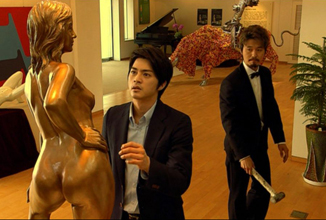 |
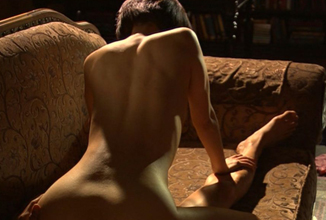 |
You see, Natali has delusions of grandeur and is utterly convinced that it is a sexually charged, yet poignant, heartbreaking romantic drama laced with insightful social commentary detailing themes of polygamy and the changing nature of relationships in modern day society. Sadly, it is mistaken on every level, with director Ju Kyung-joong (who also co-wrote the film's screenplay with Kim Wook) thinking that a single statement within forced dialogue is enough to be considered discussion of a subject.
Case in point: While having sex with exhibition curator Park Hyo-rim (Kim Ki-yeon), Jun-hyuk dispels any thought of wrongdoing on their part by claiming that "It's becoming a world of polygamy. Adultery is simply a word from the past". However, not only is Jun-hyuk unmarried, but he has already made it abundantly clear that he fully intends to stay single and, as such, his actions are neither polygamous, nor monogamous for that matter - instead just being one of the many sexual encounters of a man who repeatedly sleeps around - while Hyo-rim (who is married) is simply committing the adultery that Jun-hyuk claims no longer exists.
Later, within Jun-hyuk and Min-woo's ongoing man-to-man conversation, the film’s underlying ‘discussion’ attempts to become a dissection of fidelity vs. infidelity, but even though the blatantly obvious commentary within the dialogue carries on for a protracted period of time, it is, once again, ultimately little more than a statement of fact, with an acknowledgment that the two men have opposing viewpoints.
After this point, one can't help but feel that director Ju believes his theme discussions are complete, and virtually the only other mentions of the nature of relationships come from Jun-hyuk telling Mi-ran that a man only marries when he gets ensnared by a "cruel and spiteful woman", and Min-woo later claiming that some people can live together forever "with love and truth". As far as director Ju is concerned, that's all that is required, and the social commentary (such as it is, in his mind) is subsequently, and quickly, forgotten.
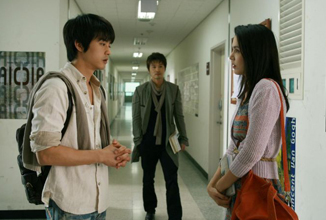 |
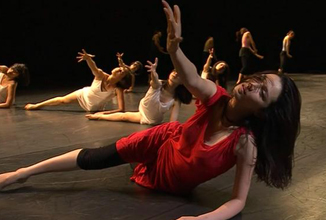 |
Ok, since the sex scenes are largely unsexy, and the social commentary doesn't actually comment, surely the story of Mi-ran herself, the creation of the statue of Natali and the final outcome for each of the main characters must be worthy of telling, mustn't it?
It actually pains me to say it, but that's rather a letdown too, and interminably dull in the process. Aside from the sex scenes (all shown in flashback), the vast majority of Natali consists of Jun-hyuk and Min-woo talking/arguing alone in the exhibition hall and though, early on, this brings to mind character study theatrical plays, the use of overly pretentious, badly conceived, ludicrously unbelievable and noticeably contrived dialogue (e.g. "A poet once said 'Life's a bitch'"; and "Tell Mi-ran...", "I won't tell her because I can't...", "Why can't you tell her?", "Because... she's...." etc.) combined with an utter lack of character depth - especially in the deeply unlikeable character of Jun-hyuk - result in a failure to elicit any viewer empathy whatsoever.
Not only that, but repeated red flags are almost waved to signal pivotal plot events far in advance (not to mention musical shifts to heartstring tugging classical pieces, to remind viewers when they're supposed to well up with tears), turning what could have been a watchable, if formulaic, romance/melodrama into a story so unsurprising that it serves to achieve little more than making the eyes roll.
Natali's conclusion stretches credibility yet further, with the penultimate scene being so open-ended that it is totally meaningless; and the final moments of the film? Well, at least you'll know what to do if you find a giant 'Mailbox of Love' situated by a shoreline.
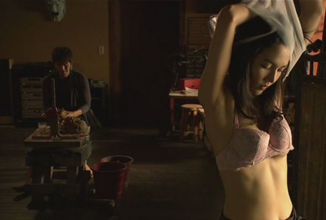 |
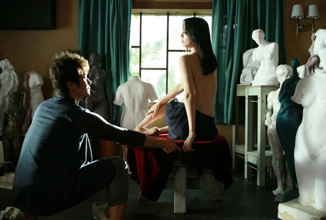 |
I have to assume that director Ju Kyung-joong, who also directed A Little Monk in 2003, was so caught up with the idea of making South Korea's first 3D film, that filming aspects took over from, and gradually replaced, his belief in the need for an original plot. Either that or he was holding his "Great Melodrama" crib sheet upside down.
Summary:
If you're in need of a film with an engaging, heartfelt storyline, then watch an insightful drama; if you're looking for a sex film, watch a sex film. Despite its marketing, Natali fits into neither of these categories, and the most positive thing that can be said is that it's in 3D.
Cast:
The entire cast in Natali face an uphill struggle from the very outset of the film, with the (already mentioned) contrived and unbelievable dialogue making it near impossible for any of them to give a memorable or nuanced performance. Add to that the fact that repeated scenes involve characters standing utterly still for a number of seconds before any dialogue takes place, and viewers will almost be waiting for the word "Action" to be heard in the soundtrack. Obviously occurring in an attempt to add gravitas and a theatrical quality to proceedings, this routinely fails and ultimately serves only to (unintentionally) remind viewers that they are watching actors playing parts on screen.
In fact, the only commendation that can really be given is for the bravery of the cast in the sex scenes, being required to be fully naked for a great deal of the time and, in the case of the female cast members, being willing to be shown with full-frontal nudity on several occasions.
Cast (Actor...
Character):
Lee Sung-jae… Jun-hyuk
Kim Ji-hoon… Min-woo
Park Hyun-jin… Mi-ran
Kim Ki-yeon… Park Hyo-rim
DVD
The DVD used for this review is the Korean (Region 3) 2-Disc release from Buzz Pictures, presented as an anamorphic transfer with an aspect ratio of 2.35:1. Both 2D and 3D versions of the film are provided, along with two pairs of red-green 3D glasses:
Disc 1:
Disc 1 contains the 2D version of Natali.
The print used for the transfer to DVD is exceptionally clean and there are no visual issues present. Colours are full and well balanced throughout, with darker scenes, especially (containing the majority of the film's Category III content), appearing sumptuous.
Sound is provided as a choice of Dolby 5.1 Surround Sound or Dolby 2.0 and each is clean and crystal clear.
Excellent subtitles are also provided for this 2D version of the film.
Disc 2:
Disc 2 contains the 3D version of Natali, converted to the red-green 3D format to enable viewing on normal television screens and monitors.
I watched the 3D transfer on three different screen set-ups: a 50-inch plasma screen, a 17-inch LCD screen and an old-school cathode ray tube TV. The 3D effect on both the the plasma screen and the CRT is negligible, at best, with only moments here and there actually appearing three dimensional. There is also a noticeable ghosting apparent on these screens (caused by the red-green 3D) within scenes in which characters appear in the distance, to the extent that any viewer would almost immediately give up and switch to watching the 2D version on Disc 1.
The 3D effect was far more noticeable on the LCD screen, with the majority of the Category III content looking fairly striking and realistically three dimensional. However, the success of the 3D effect in these scenes actually brings attention to the fact that there is very little need for 3D in the majority of the other scenes, largely featuring, as they do, just the two main male characters standing still while talking/arguing with each other.
Not only that, but the red-green ghosting of characters, from middle distance to further back in frame, is still evident and though it detracts from the viewing experience to a far lesser degree than on the other screens, it does still detract, nonetheless.
Sound is provided as a choice of Dolby 5.1 Surround Sound or Dolby 2.0 and each is clean and crystal clear.
English speaking viewers should also note that no subtitles are provided for the 3D version of the film.
There are no other Special Features provided on either disc.
DVD Details:
• Director: Ju Kyung-joong
• Format: NTSC, Anamorphic, Widescreen, Subtitled
• Language: Korean
• Subtitles: Korean/English/None
• Sound: Dolby Digital 5.1, Dolby Digital 2.0
• Region: Region 3
• Aspect Ratio: 2.35:1
• Number of discs: 2 (Disc 1 - 2D, Disc 2 - 3D)
• Classification: Category III (Korean Film Classification)
• Distribution: Buzz Pictures
• Run Time: 88 minutes (approx.)
As a final side note: The spelling of the English translation of the film's title is inconsistent, with the spelling 'Natali' appearing in the opening credits and in the English subtitles, while on the DVD cover the spelling 'Natalie' is used. I therefore chose to follow the spelling used within the film itself.
|










